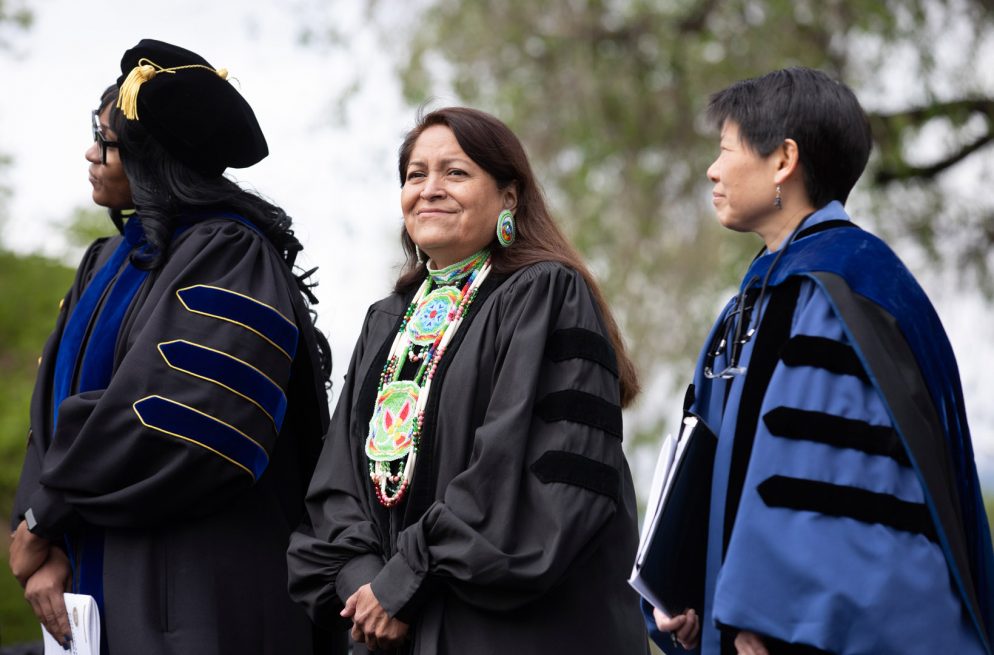Debbie Howell began as Colorado College’s first elder-in-residence on Oct. 1. Howell, a member of the Pawnee and Dakota tribes, comes to the college with extensive civic engagement experience, having served as co-chair of the Native American Advisory Council with the Emerging Leaders Development Program at El Pomar Foundation, and contributing her knowledge to many Native, women’s, and community committees and causes. Howell’s understanding of eldership in the Native tradition, including Native history, traditions, and practices, will serve her well in this position, as she holds scheduled office hours, builds relationships with and mentors students, supports on-campus events, and connects CC to relevant community resources.
The Bulletin spoke with Howell about her background and her hopes for this position.
What is your personal and professional background coming into this position?
I have a management degree, so most of my adult life I was in a business. I did different things at these businesses — actually they were sister companies, so I ended up transferring to the second one. It moved out of town a few years ago and I ended up retiring. But mostly business. I’ve been a trainer. I’ve been in a lead position, and more recently before I left work, I was an admin assistant for a while. And then a data analyst.
When did CC reach out to you about this position?
Some of the faculty reached out in June of 2018, and then I spoke with Dean [of Students Mike] Edmonds in late August or sometime early September to make it official.
What were your initial expectations for what this position was going to look like?
I am here for a diverse community of students, and I’d rather it’s said that way because I don’t want anyone to feel excluded. I knew that I’d be working and helping the Native American Student Union students with their powwow in the springtime, and as a community member, I’d come in while they were planning the Indigenous days. So I really came in being able to just be somebody to fill the role as like a traditional Native American grandparent. And it’s not to take the place of their grandparent or their mother or aunt or uncle or anything like that, but just in that traditional role where I could offer comfort. I could offer advice about spirituality if they’re looking in the direction that I follow, or I could direct them to other sources out there if it fit them better. And also to present cultural activities and traditional teachings. And I was hoping that we’d be able to share languages, saying ‘hello’ and ‘see you later,’ or ‘have a nice day.’ Not everyone has ‘have a nice day,’ but something along those lines.
What do you like to do when you’re not working?
When I’m not working, I am involved in several nonprofit organizations. One thing I do during the summer is work on the Rock Ledge Ranch Powwow, and that’s at the [Colorado Springs] city park of Rock Ledge Ranch. So we have that in September. But then also I am a co-chair of El Pomar Foundation’s Emerging Leaders Development, and we do several activities. So I take part in their Milton E. Proby Committee, where we select a deceased person of color [to honor], and it rotates each year. So we’re involved in different ways when that’s going on. And then we also help with a college readiness program. And then outside of that, I do like to go to powwows.
What is an interesting fact that people might not know about you?
Not only do I like to go to powwows, but I’m also part of an Indian — we call it Indian — dance troupe. And our family used to be up at Seven Falls during the summertime, so it was like a full-time job for our children as they were growing up and then part-time for us because we were working. And then our group got asked to go to Turkey in 2010. We spent 10 days and visited, I think, seven different cities. And that was through the U.S. State Department.
Looking forward to this year, what are your greatest hopes?
Well, I hope that the students feel comfortable enough to come and talk to me at any time and that they understand that I’m really here to support them spiritually, emotionally, and traditionally if I can help them in some manner. I hope I can help them in their personal well-being and play a part in that.
